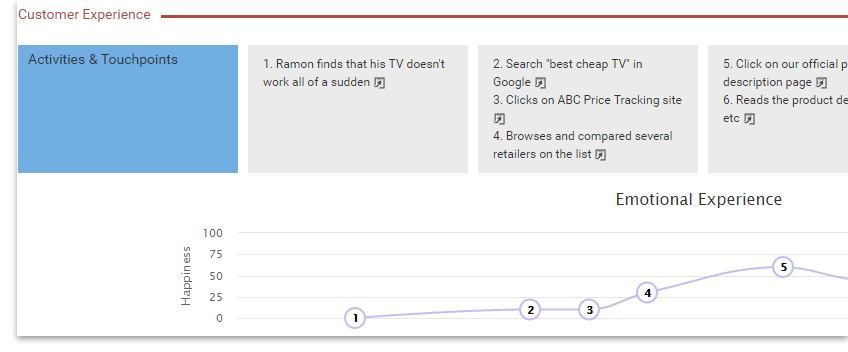Gain integrated insights that help identify and implement customer-centric initiatives.

Customer Journey Mapping is emerging as a powerful Customer Experience (CX) tool. It facilitates the studying of customer experience by visualizing customers' thoughts and feelings through the touchpoints, which are the points of interaction that might alter the way the customers feel about a product, brand, business or service.
Customer Journey Mapping is a compact visualization of an end-to-end customer experience. It helps businesses deepen their understanding of their customers' behaviors, thoughts, and feelings, empowering businesses to make value-driven decisions based on a customer experience model. If you want to learn more about how to develop a Customer Journey Map, please read Tutorial - How to Develop a Customer Journey Map?
 1 2 3 4 5 6 7 8
1 2 3 4 5 6 7 8
Critical milestones of a customer journey.
A fictional character developed to represent a specific group of customer.
Establish meaningful grouping to lanes.
A particular aspect of customer journey. Typical journey map has lanes that describe the touchpoints, customer emotions, thinking and ideas for improvements.
List information in item base.
Categorize items by applying different color code.
Compare a set of statistical information with cell-based chart.
Show or compare a quantitative progression over time.
Describe the steps of a journey with numbered items.
Present the change of customer emotion over time. The nodes refer to the items listed in a particular lane.
 9 10
9 10
 11 12 13
11 12 13
Visualize a customer journey with images.
Besides listing information point by point, you can also write description for the entire cell.
Present the change of customer emotion throughout the stages with smiley faces.
Describe the steps within a stage with numbered items.
Link between touchpoints, customer thinking/feeling and ideas for improvements.
 14 15
14 15
Customer journey can shed light on product strategies, which typically composes by a number of inter-related levels: such as Action, Thinking, Feeling and so on. Visual Paradigm automatically maintain the traceability you've established among them. You can make a customer thought reference to a touchpoint and you can also suggest improvement action(s) referenced to the customer's thoughts (pain points) that your team addresses. The linkages of the data are shown on the journey map, enabling you to identify silos and gaps more effectively.


A journey map is a widely shared artifact in your organization. Depending on what the stakeholders are looking for, different stakeholders may wish to focus on various aspects of the map. Our Doc. Composer enables you to output the data in a journey map with different orders and orientations. You can print a comprehensive journey map report either in column or row-based format in just a few clicks.